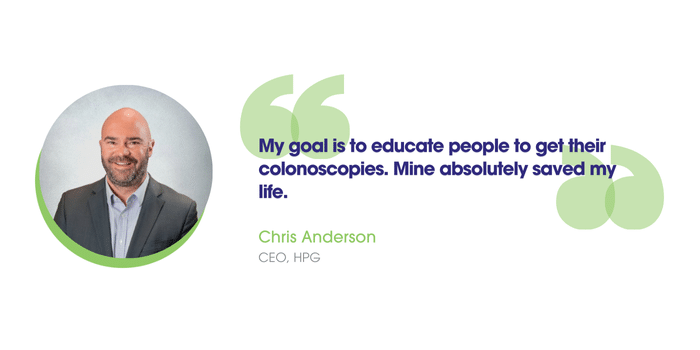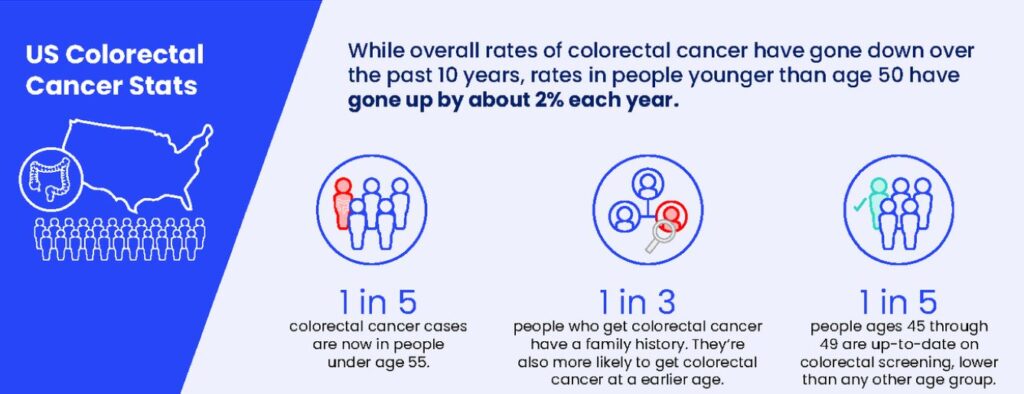At first, the doctor did not think a colonoscopy was necessary for Chris Anderson, CEO of HPG and current member of the PPAI Board of Directors.
That’s an important place to start. It was Anderson, after other test results were inconclusive, who suggested that he receive a colonoscopy –as he had been experiencing a prolonged uptick in fatigue. This procedure is what led to his colon cancer diagnosis.
Anderson recently shared his story with PPAI Media in order to spread awareness of the importance of regular cancer screenings such as colonoscopies.
“As much as a platform as I have or as we have at PPAI – my goal is to educate people to get their colonoscopies,” Anderson says. “Mine absolutely saved my life.”
- Current guidelines suggest that individuals receive their first colonoscopy by the age of 45 and subsequent ones should be scheduled at least every 10 years, according to the MD Anderson Cancer Center.
- However, pre-existing conditions or health scenarios could justify receiving one sooner and more frequently. Discussing the reasons for being proactive about a colonoscopy with your primary doctor can help educate you on the subject.

“I Heard The C-Word, And It Stopped Me In My Tracks”
Early in 2024, Anderson noticed his general energy levels were starting to wane, leaving him feeling uncharacteristically tired. The CEO of PPAI 100’s No. 6 supplier has always been known to be one of the higher energy people in the room, so it was a somewhat jarring development for Anderson.
He had received a colonoscopy when he was 40, so his doctor reminded him that, at 47, he wasn’t technically due to get one for another three years but responded that it couldn’t hurt upon Anderson’s suggestion.
The colonoscopy was scheduled for a few weeks later and Anderson was soon informed that a few polyps and one tumor had been discovered but he was quickly assured that there was a 99% chance they were benign. He was back at his office later that day.
A week later, on a late Friday afternoon, he received a call from an unknown number.
He was sitting at his desk, and while the doctor ambled through the medical jargon, Anderson remembers multi-tasking, trying to respond to a few emails until the other end of the phone made a concrete point.
“Then I heard the C-word – cancer – and it caused me to stop in my tracks, and it was almost one of those needle scratch moments,” Anderson recalls.
They had found was a variant of cancer called a neuroendocrine tumor.
- According to the Cleveland Clinic, about 5 in 100,000 people are affected by neuroendocrine tumors.
- On average, 77% of people diagnosed are alive five years after their diagnosis.
Anderson, who flies airplanes in his free time, coincidentally had an Angel Flight mission scheduled to fly a cancer patient from a remote corner of Montana to the Huntsman Cancer Institute in Salt Lake City, where Anderson is based.
“Little did I know that I would be a patient at that same cancer center in less than a week,” Anderson says.
Surgery was a necessity.

“A Spectrum Of Outcomes”
Anderson initially told no one of the developments beyond those in the innermost circle of his personal life and HPG. The surgery was scheduled for April 17.
“It was understood that there was a spectrum of outcomes, and the best possible outcome was it would be minimally invasive, and they would be able to remove all the cancer.”
The other end of that spectrum would be a difficult surgery that still potentially required radiation or chemotherapy to address a potential spread.
Fortunately for Anderson, it has turned out to be the best-case outcome. A successful surgery resulted in the removal of all the cancer from his body (follow-ups will still be required to monitor his health). Barely two months after the surgery, Anderson sat in his office for this interview, cancer free and cleared to travel. He is even allowed to fly airplanes again (and is excited to fly his next weekend Angel Flight mission –which will be particularly meaningful).
The cancer had been caught before it could spread. If Anderson had waited three years, until he was technically due for a colonoscopy, the likely outcomes would have been considerably more harrowing. The experience has made him something of an advocate for the procedure.
“I’m ready to shout it from the rooftops and share my story,” Anderson says. “Hopefully if it reaches even just one person who is teetering on whether or not to get a colonoscopy, they go and get it.”


